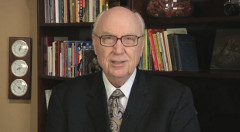 Growing up in Assemblies of God churches, I often heard preaching in an imperative—even imperial—mode. Pastors operated with a command-and-control model of leadership that carried over into the pulpit.
Growing up in Assemblies of God churches, I often heard preaching in an imperative—even imperial—mode. Pastors operated with a command-and-control model of leadership that carried over into the pulpit.
They thundered forth the Word of God in a high, loud and fast tone of voice. They left no time for questions and made no space for nuance. When they finished their sermons, all they wanted was a yes or no answer from the congregation.
Early on in my pastoral career, perhaps as a reaction to imperative-mode preaching, I preached in the indicative mode. I downloaded information on members of my congregation with a professional tone of voice. My sermons were long, complex and nuanced.
There is a place for both imperative- and indicative-mode preaching. Sometimes, pastors must exercise their authority as leaders of their churches. At all times, they must teach—through word and personal example—what Christians believe and how they behave. But as I matured as a pastor, I came to realize that most preaching occurs in the subjunctive mode. It expresses fond wishes and makes heartfelt requests. It urges, appeals, comforts, encourages, pleads and exhorts more than it commands and as often as it informs.
Get Spirit-filled content delivered right to your inbox! Click here to subscribe to our newsletter.
Both imperative- and indicative-mode preaching assume that pastors exist over the members of their congregations. In the former, pastors have authority over others, which is why they issue commands. In the latter, pastors have a level of knowledge over that of their members, which is why they teach them. But in subjunctive-mode preaching, pastors exist alongside members of their congregation. Paul addressed the Romans as adelphoí, literally, “brothers [and sisters].”
Popular commentaries point out that the verb parakaléo comes from two words meaning “to call” (kaléo) “alongside” (para). Whether that is the word’s proper etymology, “to call alongside” is a good description of preaching specifically and pastoring generally.
- When you preach, does your tone of voice call people alongside you, or does it distance them from you?
- What about your demeanor in the pulpit? Does it draw church members in or push them away?
- Outside of the pulpit, can church members approach you as an elder brother or sister for biblical counsel? Or does dealing with you cause them fear and anxiety?
Our preaching tone and our personal demeanor—in the pulpit and out of it—must call people alongside us in a relationship of mutual respect and trust. Without that relationship, we cannot lead people toward the holiness God seeks from them. For, as has often been said, “People don’t care how much you know until they know how much you care.”
George O. Wood is general superintendent of the Assemblies of God. For the original article, viist georgeowood.com.Get Spirit-filled content delivered right to your inbox! Click here to subscribe to our newsletter.
Dr. Steve Greene is now sharing stories, teachings, and conversations with guests who lead with love on Love Leads, a new podcast. Listen now.
Dr. Mark Rutland's
National Institute of Christian Leadership (NICL)
The NICL is one of the top leadership training programs in the U.S. taught by Dr. Mark Rutland. If you're the type of leader that likes to have total control over every aspect of your ministry and your future success, the NICL is right for you!
FREE NICL MINI-COURSE - Enroll for 3-hours of training from Dr. Rutland's full leadership course. Experience the NICL and decide if this training is right for you and your team.
Do you feel stuck? Do you feel like you’re not growing? Do you need help from an expert in leadership? There is no other leadership training like the NICL. Gain the leadership skills and confidence you need to lead your church, business or ministry. Get ready to accomplish all of your God-given dreams. CLICK HERE for NICL training dates and details.The NICL Online is an option for any leader with time or schedule constraints. It's also for leaders who want to expedite their training to receive advanced standing for Master Level credit hours. Work through Dr. Rutland's full training from the comfort of your home or ministry at your pace. Learn more about NICL Online. Learn more about NICL Online.